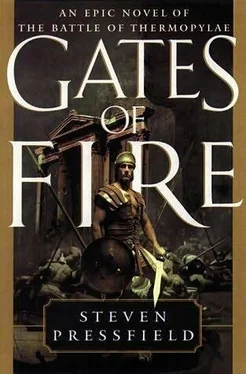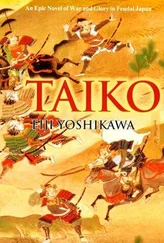Steven Pressfield - Gates of Fire - An Epic Novel of the Battle of Thermopylae
Здесь есть возможность читать онлайн «Steven Pressfield - Gates of Fire - An Epic Novel of the Battle of Thermopylae» весь текст электронной книги совершенно бесплатно (целиком полную версию без сокращений). В некоторых случаях можно слушать аудио, скачать через торрент в формате fb2 и присутствует краткое содержание. Жанр: Историческая проза, на английском языке. Описание произведения, (предисловие) а так же отзывы посетителей доступны на портале библиотеки ЛибКат.
- Название:Gates of Fire: An Epic Novel of the Battle of Thermopylae
- Автор:
- Жанр:
- Год:неизвестен
- ISBN:нет данных
- Рейтинг книги:3 / 5. Голосов: 1
-
Избранное:Добавить в избранное
- Отзывы:
-
Ваша оценка:
- 60
- 1
- 2
- 3
- 4
- 5
Gates of Fire: An Epic Novel of the Battle of Thermopylae: краткое содержание, описание и аннотация
Предлагаем к чтению аннотацию, описание, краткое содержание или предисловие (зависит от того, что написал сам автор книги «Gates of Fire: An Epic Novel of the Battle of Thermopylae»). Если вы не нашли необходимую информацию о книге — напишите в комментариях, мы постараемся отыскать её.
Gates of Fire: An Epic Novel of the Battle of Thermopylae — читать онлайн бесплатно полную книгу (весь текст) целиком
Ниже представлен текст книги, разбитый по страницам. Система сохранения места последней прочитанной страницы, позволяет с удобством читать онлайн бесплатно книгу «Gates of Fire: An Epic Novel of the Battle of Thermopylae», без необходимости каждый раз заново искать на чём Вы остановились. Поставьте закладку, и сможете в любой момент перейти на страницу, на которой закончили чтение.
Интервал:
Закладка:
Alexandras was made to stand forth before his elders at the position of boy's attention, hands tucked from sight beneath the folds of his cloak, eyes glued to the floor as not yet worthy of rising to meet a Peer's full in the face.
How did you enjoy the battle? Polynikes queried.
It made me sick, Alexandras replied.
Under the interrogation the boy confessed that he had been unable to sleep since, neither aboard ship nor on the march home. If he closed his eyes even for a moment, he declared, he saw again with undiminished horror the scenes of slaughter, particularly the death spasm of his friend Meriones. His compassion, he acknowledged, was elicited as much by those casualties of the enemy as for the fallen heroes of his own city. Pressed hard upon this point, the boy declared the slaughter of war barbarous and unholy.
Barbarous and unholy, is it? responded Polynikes, darkening with anger.
The Peers in their messes are encouraged, when they deem it useful for the instruction of youth, to single out one lad, or even another Peer, and abuse him verbally in the most stem and pitiless fashion. This is called arosis, harrowing. Its purpose, much like the physical beatings, is to inure the senses to insult, to harden the will against responding with rage and fear, the twin unmanning evils of which that state called katalepsis, possession, is comprised. The prized response, the one the Peers look for, is humor. Deflect defamation with a joke, the coarser the better. Laugh in its face. A mind which can maintain its lightness will not come undone in war.
But Alexandras possessed no gift for the wisecrack. It wasn't in him. All he could do was answer in his clear pure voice with the most excruciating candor. I watched him from my service station at the left of the mess entrance, beneath the carven plaque- Exo tes thyras ouden, Out this door nothing-meaning no word spoken within these precincts may be repeated elsewhere.
It was a form of high courage which Alexandras displayed, to stand up to the Peers' hammering without a joke or a lie. At any time during a harrowing, the object boy may signal and call a stop.
This is his right under the laws of Lykurgus. Pride, however, prevented Alexandras from exercising this option, and everyone knew it.
You wanted to see war, Polynikes began. What did you imagine it would be?
Alexandras was required to answer in the Spartan style, at once, with extreme brevity.
Your eyes were horror-stricken, your heart aggrieved at the sight of the manslaughter. Answer this:
What did you think a spear was for?
A shield?
A xiphos sword?
Questions of this kind would be put to the boy not in a harsh or abusive tone, which would have been easier to bear, but coldly, rationally, demanding a concisely expressed reasoned response.
Alexandras was made to describe the wounds an eight-footer could produce and the types of deaths that would ensue. Should an overhand thrust be aimed at the throat or the chest? If the tendon of a foeman's calf be severed, should you pause-to finish him off or press forward with the advance? If you plunge a spear into the groin above a man's testicles, should it be pulled straight out or ripped upward, blade vertical, to eviscerate the man's bowels? Alexandras' face flushed, his voice quaked and broke. Would you like to stop, boy? Is this instruction too much for you?
Answer concisely:
Can you envision a world without war?
Can you imagine clemency from an enemy?
Describe the condition of Lakedaemon without her army, without her warriors, to defend her.
Which is better, victory or defeat?
To rule or be ruled?
To make a widow of the enemy's wife or to have one's own wife widowed?
What is the supreme virtue of a man? Why? Whom of all in the city do you admire most? Why?
Define the word mercy. Define compassion. Are these the virtues of war or of peace? Of men or of women? Are they virtues at all?
Of the Peers who harrowed Alexandras this evening, Polynikes did not on the surface seem the most relentless or display the harshest severity. He did not lead the arosis, nor was his interrogation overtly cruel or malicious. He just wouldn't let it stop. In the tone of the other men's voices, no matter how ruthlessly they grilled Alexandros, resided at bottom the unspoken fundament of inclusion. Alexandros was of their blood, he was one of them; everything they did tonight and every other night was not to break his spirit or crush him like a slave, but to make him stronger, to temper his will and render him more worthy of being called warrior, as they were, of taking his place as a Spartiate and a Peer.
Polynikes' harrowing was different. There was something personal about it. He hated the boy, though it was impossible to guess why. What made it even more painful, to watch as it must have been to endure, was Polynikes' supreme physical beauty. In every aspect of his person, face as well as physique, the Knight was formed as flawlessly as a god. Naked in the Gymnasion, even alongside scores of youths and warriors blessed in comeliness and elevated by their training to the peak of condition, Polynikes stood out, without equal, surpassing all others in symmetry of form and faultlessness of physical structure. Clothed in white robes for the Assembly, he shone like Adonis. And armed for war, with the bronze of his shield burnished, his scarlet cloak across his shoulders and the horsehair-crested helmet of a Knight pushed back upon his brow, he shone forth, peerless as Achilles. To watch Polynikes train on the Big Ring, in preparation for the Games at Olympia or Delphi or Nemea, to behold him in the pastel light of day's end when he and the other sprinters had finished their distance work and now, under the eyes of their trainers, donned their racing armor for the final dressed sprints, even the most hardened Peers, training in the boxing oval or the wrestling pits, would pull up from their regimens and watch.
Four runners regularly trained with Polynikes: two brothers, Malineus and Gorgone, both victors at Nemea in the diaulos sprint; Doreion the Knight, who could outrun a racehorse over sixty meters; and Telamonias the boxer and enomotarch of the Wild Olive regiment.
The five would take their marks and a trainer would clap the start. For thirty meters, sometimes as long as fifty, the elite field remained a pack of straining bronze and flesh, laboring beneath the weight of their harness, and for a span of heartbeats the watching Peers would think, maybe this once, maybe this singular time, one will best him. Then from the fore, as the runners' accelerating power began to break the bonds of their burdens, Polynikes' churning shield would emerge, twenty pounds of oak and bronze sustained upon the pumping flesh and sinew of his left forearm; you saw his helmet flash; his polished greaves extended next, flying like the winged sandals of Hermes himself, and then, with a force and power so magnificent they stopped the heart, Polynikes would catapult out of the pack, blazing with such impossible swiftness that he seemed to be naked, even winged, and not belabored by the poundage upon his arm and across his back.
Around the turning pole he flew. Daylight burst between him and his pursuers. He vaulted forward to the finish, four hundred meters total, no longer in his mind competing with these lesser fellows, these pedestrian mortals, any one of whom in another city would have been the object of adoration, mobbed by throngs of admirers, but who here, against this invincible runner, were doomed to eat dust and like it. This was Polynikes, No one could touch him. He possessed in every pore those blessings of feature and physique which the gods allow to combine in a single mortal only once in a generation.
Alexandros was beautiful too. Even with the broken nose Polynikes had gifted him with, his physical perfection approached that of the peerless runner. Perhaps this, in some way, lay at the root of the hatred the man felt for the boy. That he, Alexandros, whose joy lay in the chorus and not on the athletic field, was unworthy of this gift of beauty; that it, in him, failed to reflect the manly virtue, the andreia, which it in Polynikes so infallibly proclaimed.
Читать дальшеИнтервал:
Закладка:
Похожие книги на «Gates of Fire: An Epic Novel of the Battle of Thermopylae»
Представляем Вашему вниманию похожие книги на «Gates of Fire: An Epic Novel of the Battle of Thermopylae» списком для выбора. Мы отобрали схожую по названию и смыслу литературу в надежде предоставить читателям больше вариантов отыскать новые, интересные, ещё непрочитанные произведения.
Обсуждение, отзывы о книге «Gates of Fire: An Epic Novel of the Battle of Thermopylae» и просто собственные мнения читателей. Оставьте ваши комментарии, напишите, что Вы думаете о произведении, его смысле или главных героях. Укажите что конкретно понравилось, а что нет, и почему Вы так считаете.












